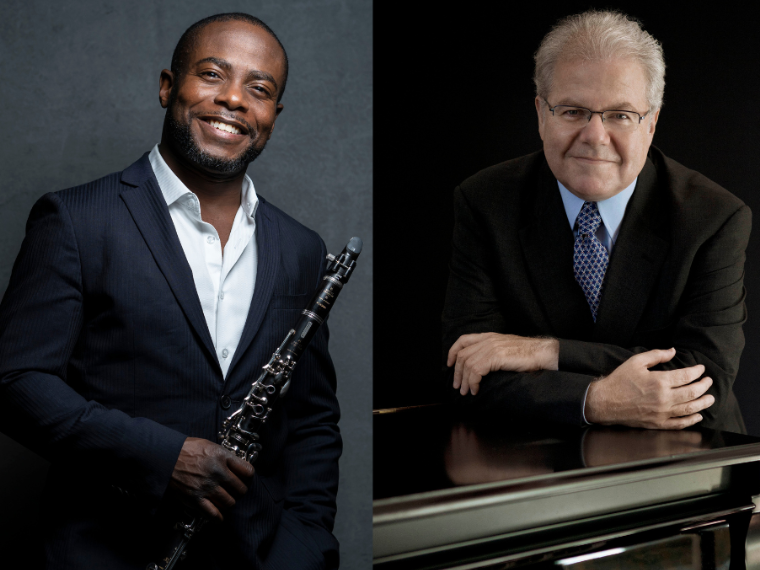by Stephanie Manning

Throughout his decades of playing chamber music, Emanuel Ax has kept his friends close. “ It’s wonderful to have people on stage that you like,” the pianist says. “I’m pretty gregarious as a person, so I like being with someone, especially old friends.”
Now in his 70s, the esteemed musician has performed with many of the same collaborators for decades, including cellist Yo-Yo Ma and violinists Issac Stern and Leonidas Kavakos. But his next recital tour brings him together with someone new: clarinetist Anthony McGill.
The duo’s upcoming performances feature a program of wide-ranging music, and their travels include a stop at Finney Chapel. That concert, on February 4 at 7:30 pm, will be presented as part of Oberlin’s Artist Recital Series.
Although McGill — the current principal clarinetist of the New York Philharmonic — is a recent collaborator, Ax says he certainly qualifies as an old friend. The two first met during McGill’s pre-college days at Chicago’s Merit School of Music, when Yo-Yo Ma invited Ax to play some trios with him and the young clarinetist.
Ax hasn’t shared a stage with McGill since then, but he’s certainly followed his career. “Of course I’ve heard him innumerable times, both at the Met Opera and at the New York Philharmonic,” he says. “He’s a fabulous, fabulous artist.”
Both musicians agreed that the centerpiece of the upcoming program at Oberlin would be Franz Schubert’s Sonata in a minor, D. 821, one of many transcriptions featured on the recital. Schubert composed this work for the arpeggione, an early 19th-century bowed instrument that quickly fell out of fashion.
Other pieces were written specifically with clarinet in mind, like Leonard Bernstein’s Sonata for Clarinet and Piano — the first published work by the celebrated conductor and composer, and one that the duo were both drawn to.
“I’m a huge Bernstein fan,” Ax says. “The piece is very, very accomplished and well put together. And a little scary, because it’s rhythmically difficult in the last movement. At my age, anything rhythmically hard is hard.”
James Lee III’s Ad anah? and Jessie Montgomery’s Peace were both suggestions that were new to Ax. “They’re both very atmospheric and lovely,” he says. Between those two contemporary works is a solo piano piece that needs little introduction — Ludwig van Beethoven’s Piano Sonata in c-sharp minor, Op. 27, No. 2, also known as the “Moonlight Sonata.”
Why the Beethoven? “It’s a wonderful piece, and it’s not too long,” he says. “It’s sixteen minutes, so that’s probably the shortest sonata one could play.” In other words: “Why not?”
Robert Schumann’s Fantasiestücke, Op. 73 is “ just so beautiful and such a wonderful opening,” Ax says. Although the three short pieces were originally written for clarinet and piano, transcriptions for cello and other instruments are also common. “I don’t get to do them very often with clarinet, so that’s nice.”
In fact, the pianist doesn’t usually play with clarinet at all. In the late ’90s and early 2000s, he recorded and toured with Richard Stoltzman, and “that’s the only other time I’ve done it,” he says. But coming back to this musical combination has been easy — “ if it’s an artist like Anthony, it’s no problem whatsoever.”
Communication between the two in rehearsal has come very naturally. “There’s not a lot of discussion, because I think we feel very similarly about the way the music goes,” Ax says. “Whatever someone wants to change, it sort of happens without us discussing it too much.”
Having enough rehearsal time in general is important to a successful performance, the pianist adds. “I think the more you actually work on things, the more you can be in the moment, because the more possibilities you’ve explored. I believe in rehearsing a lot just for that reason — not for establishing any one way of doing things, but for having the possibility to do many different things.”
The week before Ax and McGill set off on the tour, the duo will be rehearsing every day. Ax says he’s looking forward to exploring the music and the many interpretations within. “I think we’ll find that there’ll be lots of different possibilities, and we won’t have to stick to any one of them.”
Published on ClevelandClassical.com January 30, 2025.
Click here for a printable copy of this article


